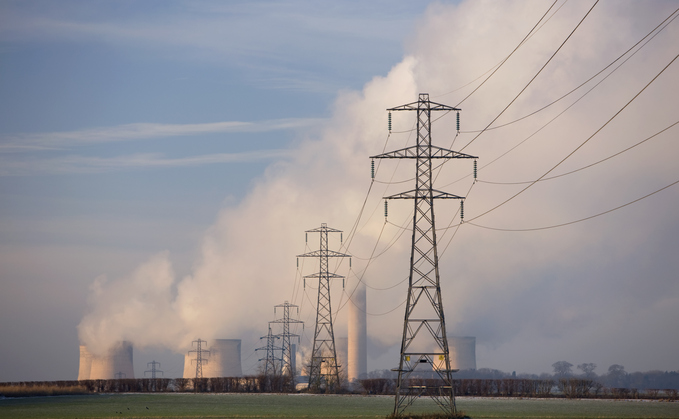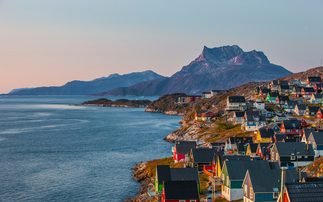
Priti Patel's latest attack on green policies makes little sense and offers no alternative vision for the future - it deserves to be rejected, line-by-line
The attacks on the UK's climate policies are now coming thick and fast. The Spectator calls for a new era of "green realism", as it erroneously informs its readers that no other country has a legally-binding net zero target. Former Chancellor Philip Hammond accuses politicians of being "systematically dishonest" about the estimated £1tr cost of achieving net zero, as he fails to inform readers that his estimate neglects to include the huge savings that would come from slashing the UK's reliance on fossil fuels. Mark Littlewood - he of the Liz Truss' favourite 'think tank', the Institute of Economic Affairs - accuses "most mainstream politicians" of paying "almost no regard" to the cost of decarbonisation, as he neglects to tell readers how the past decade has seen policies covering everything from energy efficiency and carbon capture to nuclear and carbon pricing delayed or diluted because of concerns over costs. The straw men are now so numerous you could start a climate-induced wildfire with them.
And this morning, the arguments against the UK's net zero strategy reached what we can only hope is something of a nadir, as former Home Secretary Priti Patel channelled Richard Nixon to call on "our country's hard-working and silent majority to take back control of the green agenda". Writing in the Sun, Patel backed the newspaper's new campaign to put a "brake" on policies designed to accelerate the transition to electric vehicles (EVs) and urged the government to "make meaningful changes to its plans to reach net zero". She did not explain what these meaningful changes should be, nor how they would still ensure that net zero emissions are achieved.
Now, there are few tools in the journalistic armoury blunter than a good 'fisking', but it's the middle of summer and the argument put forward by Patel is so misleading, so damaging, and so flawed that frankly it deserves a line-by-line critique. It is also such a neat distillation of all the recent attacks on the UK's net zero strategy that unpacking it point by point could prove a constructive exercise.
So, here goes.
For too long, hard-pressed families and businesses have been shut out of the discussions around the environment, climate change and pollution.
The first of many completely unevidenced claims. The environment, climate change, and pollution have been a significant and growing part of public discourse for well over a decade. There have been numerous elections where all the parties, including those opposed to climate action, have clearly set out their stance on the environment. There have been local referenda on air quality measures that the government in which Patel used to serve demanded. There have been citizens assemblies, myriad policy consultations, and thousands of MPs' surgeries. There have been more climate sceptic hosted radio phone-ins than it is possible to count. Meanwhile, the environment is now a top three issue of concern for a third of people, up from just seven per cent in 2011.
There is arguably a legitimate concerns about levels of political engagement in the UK, but the public are no more "shut out" of discussions on the environment than they are on any other issue. In fact, politicians are arguably more concerned about public opinion on environmental issues than they are in other areas.
Disruption by the likes of Extinction Rebellion and Just Stop Oil have dominated media coverage, while for decades politicians have embraced the language of green campaigners by introducing targets and taxes.
Yes, climate activists have secured media coverage in recent years, but the bulk of the coverage has been highly critical of their tactics and any increase in coverage has come from the lowest of bars. In 2020 the word ‘cake' was mentioned more often than the words ‘climate change' on UK television.
The idea targets and taxes represent the 'language of green campaigners', and not the language of government, is just bizarre. Governments do not introduce targets and taxes because campaigners tell them to do so, they do so because those are two of the main levers available to them if they want to actually govern. You would have thought Patel would have picked up on this while serving in a government that repeatedly missed targets on net migration, inflation, economic growth, and a lot more besides, while also pushing taxes up to the highest level since the Second World War.
Conservative, Labour, and Lib Dem ministers in successive governments have pledged to meet targets, often without clear plans on delivery.
Define 'often'. Because in the past six years alone we have had a Clean Growth Strategy, a 25 Year Environment Improvement Plan and Environment Act, a Prime Ministerial 10 Point Plan for a Green Industrial Revolution, a 'Build Back Greener' Net Zero Strategy, a British Energy Security Strategy, and a 'Green Day' policy package that updated most of the above. Meanwhile, the Climate Change Committee (CCC) has provided annual progress reports and policy recommendations detailing how the UK economy can deliver on its climate goals. An entire academic field has developed to further explore how climate targets can best be delivered. These various reports, strategies, and delivery plans run to tens of thousands of pages. Patel was in the Cabinet when most of them were released.
Worryingly, a lack of attention has been given to the impact these policies will have and, as a result families, businesses and motorists have been caught in the crossfire.
That means we're being hit hard with higher costs in pursuit of meeting targets and politicians trying to outdo each other.
There are cost impacts from some climate policies, but the idea there has been a "lack of attention" towards these costs is palpably ridiculous. David Cameron famously slashed 'green tariffs' on energy bills because of such concerns, projects in areas as diverse as carbon capture and storage and active travel have had budgets slashed in recent years over cost concerns, more demanding energy efficiency rules have been repeatedly deferred because of the cost implications for landlords and housebuilders. Meanwhile, the 'costs' imposed in pursuit of climate targets are a fraction of the costs imposed in the past year by soaring fossil gas prices.
We've already faced extra levies on our energy bills and new rules on waste and recycling will hit consumers and businesses with extra costs.
The new rules on waste and recycling have already been delayed, but they are designed to shift the costs of recycling and waste processing onto the companies producing excess packaging and away from local authorities. Households are already paying these costs through their council taxes (council taxes the government has repeatedly failed to reform to make them more progressive). If the new rules work as intended they will reduce overall costs by incentivising firms to reduce levels of packaging waste.
And as for the levies on our energy bills, as detailed analysis has shown UK energy bills would have been £2.5bn lower had the government not slashed the energy efficiency and renewables schemes that green levies enabled. More broadly, if the government wanted to limit the impact of these levies still further, it could have paid for them through progressive taxation.
Some councils are also charging some cars more to park based on emissions, punishing families on low incomes.
And some councils are offering free town centre parking to encourage people to drive. Leaving aside the fact that households on the lowest incomes are least likely to own a car, for obvious reasons, what exactly is wrong about asking those drivers of cars who impose the biggest health externalities on others to pay more? Isn't this how regulated markets are supposed to work?
More broadly, it is nice to see former Ministers in a government that has overseen the worst wage growth since the Napoleonic era worry about families on low incomes, but the idea the environmental agenda is a source of poverty in this country is utterly ahistorical.
Now people who drive anywhere in London are about to be hit by the Mayor imposing his hated ULEZ tax, which will cost up to £4,500 a year.
Only the 10 per cent of drivers with cars that do not meet air quality standards will face the charges - and they can access grants to help upgrade to a cleaner vehicle. Yes, it would be better if these grants covered the full cost of a new car, but the government refused to provide such funding. However, it did require local authorities to come forward with plans to meet air quality targets. What would the government have had Mayor Sadiq Khan do instead?
The revelation in today's Sun on Sunday that a nationwide Ulez-style scheme could rake in £100m per day is shocking and must mark a turning point where we say enough is enough.
The only thing "shocking" about this story is the idea anyone would be credulous enough to think it will actually happen. That said, now would be a good point for a column attacking air quality policies to explain how the author would like to see the UK's dangerously dirty air cleaned up. Is there even the semblance of an alternative plan here, or are we to assume Patel is perfectly happy with current levels of air pollution?
The British people are not cash cows ready to be milked and have their freedoms sacrificed at the altar of a twisted and dogmatic green outlook.
No one suggested they were and no one serious is proposing a "twisted and dogmatic green outlook". To allege otherwise is to veer dangerously towards tinfoil hat-wearing conspiracy theorising. Governments are trying to work out the most cost-effective way to decarbonise their economies in response to an escalating global climate crisis and seize the economic opportunities offered by the emergence of the clean tech industries that will dominate the 21st century. To suggest there is some kind of freedom-threatening dogma at play here is to toy with various genuinely dangerous online tropes that mainstream politicians should be very wary of giving airtime to.
Sun readers know that the way to improve our environment and tackle climate change is through a commonsense approach that carries the confidence of the public rather than trying to shame and punish them.
Sun readers may know this, but the rest of us are at a loss. Could Patel please explain what this "commensense approach" actually entails? How is the UK meant to improve our environment and tackle climate change if not via current policies and targets? Where is the credible alternative plan or is this just a cover for climate denialism?
That's why I back The Sun's Five-Point Plan to protect motorists and the wider economy from the most painful and costly measures and to ensure that green targets are reached in sensible way.
The Sun's Five-Point Plan categorically does not constitute a "commonsense" means of improving our environment and tackling climate change, and it will not ensure green targets are reached, in a sensible manner or otherwise.
It calls for no ULEZ extension or Low Traffic Neighbourhoods where the public objects, but offers no alternative proposals for improving air quality. It calls for a delay to the 2030 ban on the sale of new internal combustion engine cars and mischaracterises it as a ban on petrol and diesel cars when plug-in hybrids will remain available. But it makes no mention of how the bulk of the auto industry is supportive of the target as a means of driving investment. It calls for the scrapping of the zero emission vehicle mandate, but has nothing to say on how the industry should manage the global transition towards EVs. And it calls for no new 'green motoring stealth taxes' and a fuel duty freeze, while neglecting to mention fuel duty has been frozen for 11 years.
In the run up to next year's General Election, voters must tell politicians that they need to stop pursuing a green agenda that costs us more money and will fail to deliver.
Voters tell politicians at every election not to pursue policies that cost them money and fail to deliver. Thankfully, no one is proposing such policies. The aim of the climate policies pursued by all parties - including those from the government of which Patel served - is to reduce the worsening risks and costs faced by the British public. The plan is to switch to technologies that are not just better for the climate and human health, but also result in reduced fossil fuel imports, less energy price volatility, higher economic productivity, and lower costs.
Not all these policies are perfect. There are definitely reforms that should be pursued to better spread the upfront costs associated with clean technologies and ensure any taxes or levies are progressive in nature. But those looking to critique such policies lose all credibility when they mischaracterise the green agenda as an attack on working people and refuse to come forward with even the vague outline of a credible alternative decarbonisation strategy.
Readers deserve better than to be treated with such contempt by politicians and commentators who strip complex and important debates of all their context. As the recent flurry of column's attacking the government's green agenda inadvertently make crystal clear, those criticising the net zero transition without any engagement with why it is needed in the first place are not serious people.
Want to understand what is going on at the cutting edge of sustainability? Check out BusinessGreen Intelligence - the premier information for professionals focused on the UK's green economy.










